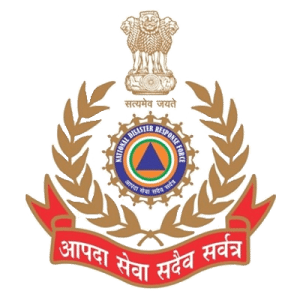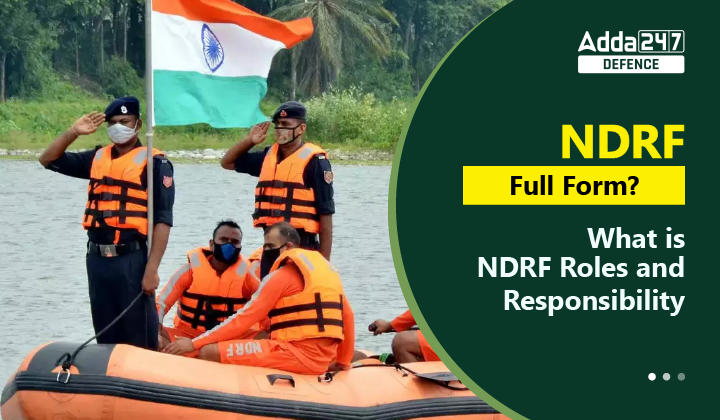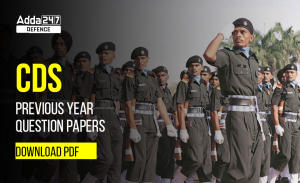NDRF Full Form
NDRF stands for National Disaster Response Force (NDRF). NDRF is a specialized force in India responsible for handling and managing various types of disasters, both natural and man-made. Established in 2006, the NDRF operates under the Ministry of Home Affairs and plays a crucial role in disaster response, relief, rescue, and recovery operations across the country. Comprising highly trained personnel and equipped with modern equipment, the NDRF has emerged as a key organization in disaster management, contributing to the safety and well-being of the nation and its citizens.
The National Disaster Response Force (NDRF) has been always at the forefront of numerous events. Recently NDRF demonstrated exceptional expertise and dedication in two such instances where NDRF exhibited its commendable rescue operations including the triple train accident in Balasore district, Odisha, and the landfall of Cyclone Biparjoy in Gujarat.

NDRF Establishment
The National Disaster Response Force (NDRF) was established on January 19, 2006, under the Disaster Management Act, 2005. The force was created with the primary objective of being a specialized response force for disaster situations in India. The formation of the NDRF was a significant milestone in India’s disaster management framework, aiming to enhance the country’s preparedness and response capabilities.
- The establishment of the NDRF was a response to the growing need for a dedicated force that could handle various types of disasters effectively and efficiently.
- Prior to its formation, disaster response in India was primarily managed by agencies such as the National Disaster Management Authority (NDMA), Central Armed Police Forces (CAPFs), and state-level agencies. However, these agencies faced several challenges in terms of coordination, specialized training, and availability of resources during large-scale disasters.
- Recognizing the need for a specialized force, the Indian government took the initiative to create the NDRF. The force operates under the administrative control of the NDMA and functions as a specialized force for disaster response and management. It consists of highly trained personnel who are equipped with the necessary skills, knowledge, and specialized equipment to respond to a wide range of disasters.
- The NDRF’s establishment involved meticulous planning, extensive training, and resource allocation. The force is composed of battalions stationed at various locations across the country, strategically placed to ensure a swift and effective response in different regions. Each battalion consists of multiple specialized teams, capable of handling specific types of disasters, such as floods, earthquakes, cyclones, chemical accidents, and nuclear incidents.
- The establishment of the NDRF brought together personnel from various backgrounds, including the Central Armed Police Forces, Indian Army, and Central Reserve Police Force. These personnel underwent rigorous training programs to acquire specialized skills in disaster response, search and rescue techniques, medical assistance, and handling hazardous materials.
Over the years, the NDRF has played a crucial role in responding to numerous disasters across India. The force has been instrumental in saving lives, providing immediate relief, and assisting in the rehabilitation of affected communities. Its establishment has significantly improved the country’s disaster response capabilities, leading to a more coordinated and effective approach to managing disasters.
Roles and Responsibilities of NDRF
Let us look at various responsibilities of NDRF –
- Disaster Response and Rescue Operations: The NDRF is primarily responsible for responding to and managing disasters, including earthquakes, cyclones, floods, landslides, industrial accidents, terrorist attacks, and chemical, biological, radiological, and nuclear (CBRN) incidents. Its personnel are trained in search and rescue techniques, medical assistance, and evacuation procedures to swiftly respond to emergencies and provide immediate assistance to affected communities.
- Pre-Disaster Preparedness: The NDRF plays a vital role in pre-disaster preparedness. It conducts regular mock drills, training programs, and awareness campaigns to enhance disaster preparedness at various levels, including government agencies, local communities, and educational institutions. The force collaborates with other stakeholders to develop response plans, identify vulnerable areas, and establish early warning systems to minimize the impact of disasters.
- Post-Disaster Relief and Rehabilitation: After a disaster strikes, the NDRF focuses on providing relief and rehabilitation to affected individuals and communities. It sets up relief camps, distributes essential supplies such as food, water, and medical aid, and ensures the safety and well-being of those affected. The force also supports the restoration of critical infrastructure and facilitates the return of normalcy to the affected areas.
- Specialized Equipment and Expertise: The NDRF is equipped with state-of-the-art equipment and specialized tools necessary for disaster response and rescue operations. This includes search cameras, life detectors, cutting and breaching tools, heavy-duty cranes, flood rescue boats, and medical kits. The force also possesses expertise in handling hazardous materials and CBRN incidents, deploying specialized teams and equipment to mitigate risks and minimize the impact of such incidents.
- Capacity Building and Training: NDRF focuses on capacity building and training to ensure the readiness and effectiveness of its personnel. It conducts regular training programs on disaster management, rescue techniques, first aid, and specialized response tactics. These training programs are conducted both within the force and in collaboration with other national and international agencies, promoting knowledge exchange and enhancing disaster response capabilities.
- International Cooperation: The NDRF actively engages in international cooperation and collaborates with disaster response agencies from other countries. It participates in joint exercises, knowledge-sharing programs, and capacity-building initiatives to learn from global best practices and contribute to international disaster response efforts. Such collaborations strengthen the NDRF’s capabilities and enable it to provide effective assistance during transnational disasters.
- Public Awareness and Education: NDRF recognizes the importance of public awareness and education in building a resilient society. It conducts awareness campaigns, workshops, and seminars to educate the public about disaster preparedness, response strategies, and safety measures. By empowering individuals and communities with knowledge, the NDRF aims to enhance overall disaster resilience and minimize the loss of lives and property during emergencies.
The National Disaster Response Force (NDRF) plays a critical role in disaster management in India. With its dedicated personnel, advanced equipment, and specialized expertise, the force ensures swift and effective response to disaster preparedness, the NDRF contributes significantly to the safety and well-being of the nation and its citizens. Through its proactive approach, the force strives to minimize the loss of lives, mitigate the impact of disasters, and facilitate the recovery and reconstruction of affected areas.
NDRF Full Form in Hindi
एनडीआरएफ का पूरा नाम “राष्ट्रीय आपदा प्रतिक्रिया बल” है। राष्ट्रीय आपदा प्रतिक्रिया बल (एनडीआरएफ) का स्थापना 19 जनवरी 2006 को दिसास्टर मैनेजमेंट एक्ट, 2005 के तहत की गई थी। यह बल मूल रूप से भारत में आपदा स्थितियों के लिए एक विशेषकृत प्रतिक्रिया बल के रूप में स्थापित किया गया है। एनडीआरएफ की स्थापना भारत के आपदा प्रबंधन ढांचे को मजबूत करने का महत्वपूर्ण कदम था, जिसका उद्देश्य देश की तैयारी और प्रतिक्रिया क्षमता को बढ़ाना था।
एनडीआरएफ की स्थापना एक विशेष प्रतिक्रिया बल की आवश्यकता को ध्यान में रखते हुए की गई थी। इससे पहले, भारत में आपदा प्रतिक्रिया को मुख्य रूप से राष्ट्रीय आपदा प्रबंधन प्राधिकरण (एनडीएमए), केंद्रीय सशस्त्र पुलिस बल (सीएपीएफ) और राज्य स्तरीय एजेंसियों जैसे बाढ़, भूकंप, चक्रवात, रासायनिक दुर्घटनाओं और परमाणु हादसों के दौरान काफी कठिनाईयों का सामना करना पड़ता था।



 CDS Previous Year Question Papers, Downl...
CDS Previous Year Question Papers, Downl...
 AOC Result 2025 Out, Download Link Activ...
AOC Result 2025 Out, Download Link Activ...
 NDA 1 Admit Card 2025 Out, Download NDA ...
NDA 1 Admit Card 2025 Out, Download NDA ...












